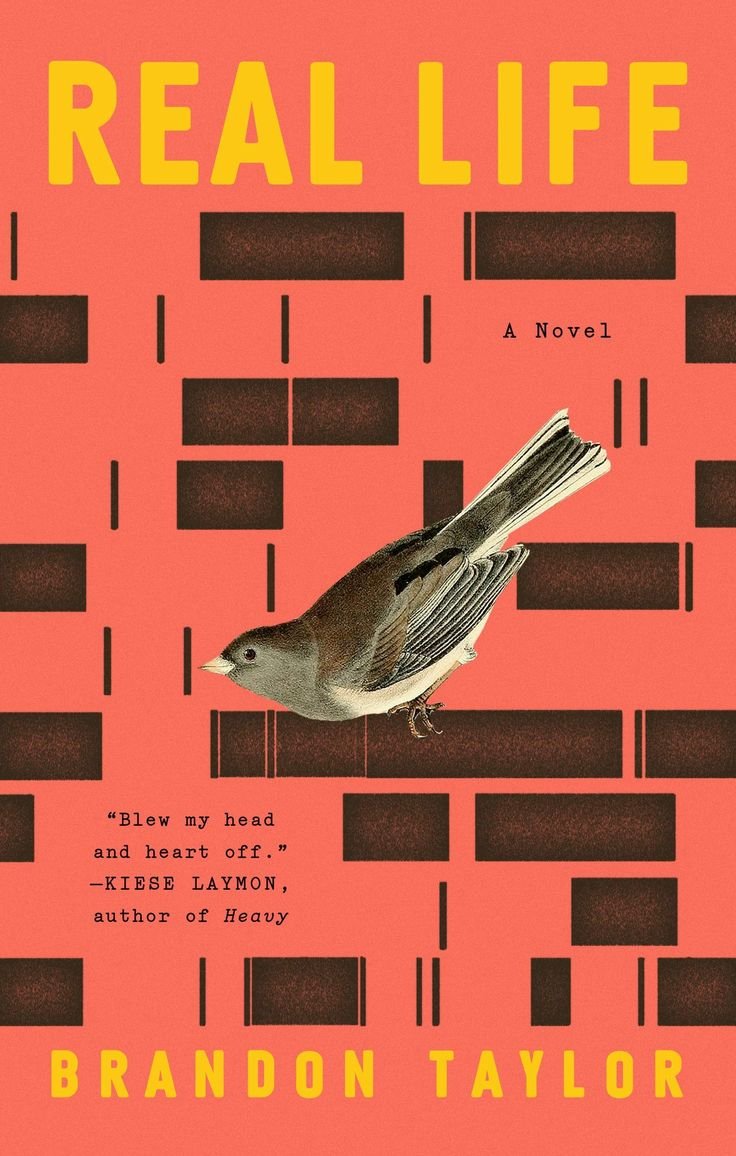Real Life by Brandon Taylor
Brandon Taylor is fast becoming one of my favorite writers. Last year I read his collection of short stories, Filthy Animals, and could not put it down. Every story felt connected, yet new and alive in a way that’s hard to manage. The stories play off one another in a way that gets under your skin. You finish one and think you’re starting fresh, only to feel the previous one creep up on you and inform the new story you’re reading. This masterful writing speaks to his meticulous work in constructing that collection.
But I won’t be talking about that collection today. Instead, I’ll be discussing Real Life, his stunning debut novel about graduate students at a Midwestern university.
Wow. Just wow. This novel is both gripping and complex. It’s tense, introspective, and moves but manages to sit with you long after putting it down. It’s unexpected but also known in a way that’s hard to accomplish.
The book follows Wallace, a young, black, queer man from Alabama working toward a graduate degree in biochemistry. He has a group of friends, most of whom are also in his program, and the novel deals extensively with the idea of being other. Most of his classmates appear to Wallace to exist comfortably in the university. They’re stressed about their work and often frustrated with their personal lives, but they know they’re accepted there. They’re in the right place. They’re the exact people who graduate programs are designed to nurture.
Wallace doesn’t feel he is one of these people.
The novel gives us extensive evidence as to why he feels this way. He has an advisor who implies he might not be up to the challenge of this program. His classmates challenge his place there and attack him for his race and sexuality. There is an explicit discussion of him being less than his classmates based on his race and upbringing and a general sense that he’s worse than the others in the program and should be grateful to be there.
Taylor handles these topics with the ease and delicacy that I’ve come to expect in his writing. He takes you through Wallace’s thought processes as a man beaten down and shaped by the structures around him. He knows he doesn’t deserve this treatment but is so tired of the constant struggle that he’s on the verge of giving up.
This novel has many brilliant sections, but it's hard not to fixate on a particular dinner where Wallace asserts himself into the group's drama. He thinks he’s helping and standing up for a friend, but the situation spirals and escalates leaving him looking like the bad guy. It’s a wonderfully crafted scene that speaks to the tension one feels at a dinner party like that. The simultaneous desire to be there and not, to be a part of the group and to be alone. This conflict defines much of Wallace’s thinking throughout the novel. He wants to finish his degree and be seen as worthy of his place there, but he also longs to leave.
During the dinner, someone spews some vile, racist comments toward Wallace. The man couches these comments in regressive sociology and tries to present them as fact. None of his friends, his so-called liberal classmates, stand up for him. No one rushes to his defense or calls the man a racist. They sit by and allow Wallace to be the punching bag. Allow this abhorrent racism to go unchallenged. Is it because they all secretly agree? Is it out of a desire to avoid confrontation? Is it just because that’s Wallace's role in the group?
Taylor is commenting on larger racial relations in our nation. How black men in America are supposed to sit by as they’re reduced to mere statistics. How they’re supposed to be grateful when they fail to conform to stereotypes, but also understand they aren’t to rise too high. As for the white liberals, they sit by and listen. Maybe, as happens in the novel, someone will come by later and comfort the aggrieved party, but no one does anything to change the hierarchy.
This is just one of many instances where Taylor uses the microcosm of a graduate program to highlight larger social issues. It’s an excellent setting for that, given its rigid hierarchy and fierce competitiveness. I was struck more than once by how this university has adopted the cutthroat nature of late-stage capitalism. The way that is not enough for you to succeed, you must also see someone else fail. The way you can never admit to a mistake and must immediately lash out when proven wrong.
I left the novel wondering about its title, Real Life. There’s a sense in the characters in the book that their real lives will begin once this program is over, but I’m not sure if Taylor is fully convinced by this. Wherever they wind up after graduate school – whether in academia or the corporate world – they will live in this same kind of microcosm. They will face the same hierarchies, and Wallace will be subjected to the same bigotry. He cannot escape it. There is no real life waiting for him somewhere. Your life is always happening, it’s always being lived, and that can be a crushing realization.
